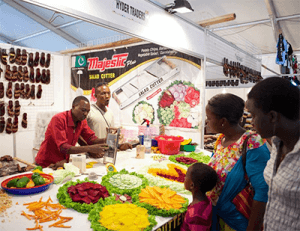Rwandan food producers are submitting themselves to the most stringent of global tests –good enough even for astronauts in space – to get a stamp of approval that will enhance their standing in world markets and help increase badly-needed exports.
“This certification has increased consumer confidence and our confidence too,” says Dative Giramahoro, of Sosoma Ltd, which mills maize. “We sell in Kenya’s Nakumatt supermarket in Kigali, so now there is no reason why we cannot sell to any Nakumatt in Kenya,” she says.
The certification is part of a programme overseen by the Rwandan Bureau of standards (RBS) to help the local food industry eat into the country’s 4-1 trade deficit with the rest of the world by increasing exports to the East African Community (EAC) and beyond.

“There is no doubt that the certification we have received will help us increase exports and we see the European Union (EU) and Canada as primary targets, even the United States,” says, Anna Uwiganza, head of Kinazi Cassava Plant ltd.
The standards are out of this world. They were pioneered by the U.S. Pilsbury Company, the U.S. army and the U.S. space programme NASA to guarantee the safety of any food that astronauts might consume in space.
Called Hazard Analysis and Critical Control Points (HACCP), the system is a set of preventive analyses to prevent bacteria getting into the food chain at every point from harvests to packaging and is the most widely used food safety standard in the world today.
“It doesn’t replace food safety but it builds on it, using hygiene as the foundation. It’s a process, a way of looking at how raw materials become food, and it will help our enterprises gain customer confidence at home and abroad and access international markets,” says Jane Nyamvumba of the Rwandan
Bureau of Standards (RBS).
“It’s been fantastic,” said SOSOMA’s Giramahoro. “It made us look at our entire process and to make improvements in handling, cleaning our equipment, pest control and other steps. Now we have brought in measures to ensure that every stage of our process meets the highest standards. It was a new way of thinking”.
The HACCP programme, so far extended to 20 Rwandan companies as a pilot project, is part of a complex programme around standards, supported by TradeMark Africa (TMA), to build trust in local and regional consumers and get approval for export.
As the EAC moves closer to integration, standards become more crucial for manufacturers of all varieties to get their goods accepted in other markets in the same way that the European Union has developed standards as a foundation of its Single Market, allowing Irish cheese manufacturers, for example, to sell their goods to Italian pizza makers.
“Our support for this programme is to help Rwanda become more competitive. The RBS stamp has already won trust in nearby markets, and the HACCP programme will only strengthen that confidence,” says TradeMark Africa (TMA) Senior Director
Country Programmes Mark Priestley.
TradeMark Africa (TMA) is working across the EAC to reinforce standards so that companies and consumers know that what they are paying for is what the label says,
eliminating time-consuming spot checks and cutting away at some of the highest transport costs in the world.
All across the five-nation bloc, TradeMark Africa (TMA) is helping national partners harmonize the standards of the most commonly traded goods in the region so that they can cross borders unimpeded by questions about authenticity or reliability or origin.
In 2012/13, 74 standards were harmonized in the EAC, of which 41 were gazette as EAC standards. These included the vital sector of edible oils, which alone accounts for trade worth $2 billion every year.
“We want to be a model of high standards”, says RBS Director-General Mark Cyubahiro Bagabe. “We want to help the East African Community improve the quality of their products to access international markets.”
Building the local standards capacity has also helped the local industry cut costs because many
had to send their products overseas or to a neighbouring country for testing, adding to already high overheads before the goods have even been sold.
TradeMark Africa (TMA) Rwanda’s approach twinned RBS with the British Standards Institute (BSI) to have a high-profile partner in building standards; TradeMark Africa (TMA) also helped provide laboratory testing equipment and training in how to use it and to conduct awareness-raising schemes so that would-be and actual exporters recognise the selling point of the RBS and HACCP stamps.
Using the new equipment, RBS introduced 11 test parameters in 2013 and expects to see 25 by 2015. Testing time abroad will fall from an average of 60 days in 2012 to around 10 by end-2015 due to local testing and that time saved will help lower test costs.
As part of the programme five companies have now applied for HACCP testing; 10 RBS officers have been trained to detect non-compliant imports as they enter the country to prevent Rwanda being swamped with sub-standard products from outside.
“Word about HACCP and RBS standards is already travelling around. This is a small country. When people hear that there is a home-grown step they can take to make their goods more attractive to consumers, they will be queuing for training,” concludes Nyamvumba.















